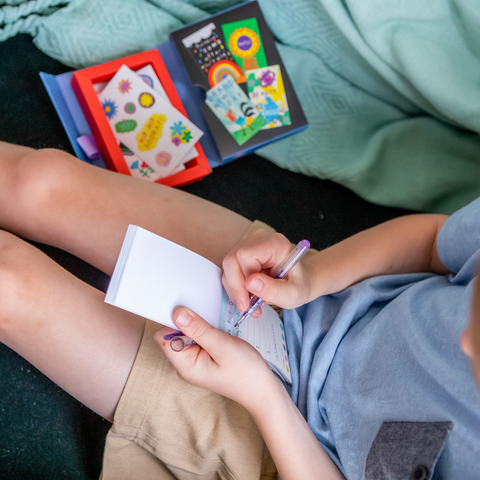
Why Every Tween Needs a Guided Journal
Journalling is a powerful way to take care of our mental wellbeing. Research shows that the process of writing things down helps to clear the mind of worries and overwhelming thoughts, to express feelings, to understand and manage emotions and to reflect on experiences. Journals are also a great place to dream and set goals. This makes journalling particularly useful for kids and tweens, as they often need help to recognise and understand their feelings.
There is no right or wrong with journalling – just write in any way that feels comfortable for you. Some kids enjoy free writing, while others feel more confident responding to prompts or questions in a guided journal format. Either way the important thing is that the journal is viewed as private and secure. This will help kids feel more confident in sharing their thoughts and emotional responses.
Reflective and guided journalling gives kids and pre-teens a safe place to self-reflect, express themselves and ‘befriend’ their emotional experiences.

It’s important to note that tweens may want to keep their emotional inner world to themselves if they don’t feel comfortable talking about it. Perhaps they don’t think people will be interested, or they worry about being made fun of or they just don’t know where to start. Reflective and guided journalling gives kids and pre-teens a safe place to self-reflect, express themselves and ‘befriend’ their emotional experiences. Children may then feel more comfortable to reach out to a trusted adult to talk about their experiences.
Have you heard about “Name it to Tame it”? This is a phrase coined by psychiatrist Dr Daniel Siegel, author of The Whole-Brain Child. In simple terms by putting a name to an overwhelming emotion, kids can better tame or “befriend” the emotion. In relation to journalling, by writing it down, children and pre-teens learn to first identify what they are feeling and then name the feeling.
The moment we write down a worry, we create psychological distance.
Writing it down is often enough to help kids think more clearly about what is going on. It helps to unload the mind of worries and stops rumination in its tracks. The emotional brain is calmed down, which then enables the ‘thinking’ brain to work effectively. We can then work out problems, gain new perspectives and mindfully choose how to respond to situations.
Sometimes parents are concerned that writing about emotions increases worries, but it does the exact opposite. The moment we write down a worry, we create psychological distance. We can then see the worry from further away and get perspective and our mind no longer needs to ‘hold’ on to the problem to create a sense of safety. The more we describe and talk about our feelings the easier it gets. Developing emotional intelligence involves talking about, describing, and naming emotions in ourselves and in others.
High levels of emotional intelligence build resilience and correlates to high levels of wellbeing. And the more socially and emotionally aware children are, the more effective they will be at managing relationships and be able to self-regulate and problem solve the difficulties in their life.
Keeping a journal has many benefits and I would encourage children to start one. If they are reluctant writers, or don’t know where to start a guided journal like Tiger Tribes Pocket Gratitude Journal is a great starting place.
